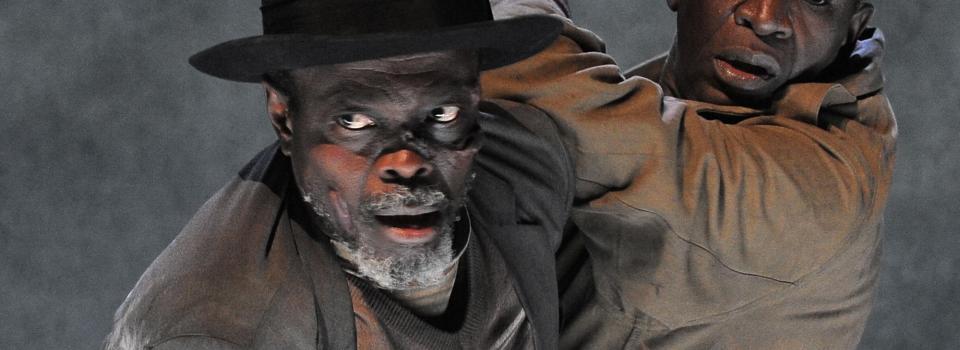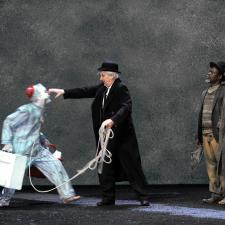
"WAITING FOR GODOT" AT COMÉDIE DE CAEN #9
“On opening night, the work we did within the cocoon of our team is shown to an audience. This first performance is the ultimate aim we have been waiting for and fearing, it must confirm whether the hypotheses that emerged in rehearsals are right or not. The quality of a performance depends on the nature of the encounter between the show and an audience”.
Lorenzo Malaguerra and Jean Lambert-wild have shared their creative and rehearsal process with us, week after week, as well as what frustrates them or makes them laugh. Now the whole team is finally facing an audience. It is opening night! Below is the rest of the diaries:
Another type of work starts now, as we adjust our performance to this new contact. We must tighten the pace, allow suspensions, be attentive to the audience’s laughter and notice when it happens, identify too the moments where the audience’s focus slackens, which is something we can clearly feel from the stage. Some directors like to attend every performance so they can maintain their actors in a permanent state of work, while others prefer to leave it to the actors to take ownership of the show once it has opened. Our original arrangement of three directors with two of them performing in the show, means we can be flexible in the way we monitor the performance. Until now, our process has been a relay race, and we will continue to follow that model.
TRUST AND FRAGILITY
In this opening performance, we have to present ourselves in a state of both trust and fragility. Trust in the multitude of encounters that a specific production solidifies: the looks, positions of the body, movements, the way props are used, clowning numbers, how the lines are delivered, silences. Fragility to enter in a dialogue with the audience, be attentive to what it gives us, be aware of the sighs, the inopportune coughing fits, the murmurs and at times the magnificent sensation that comes with feeling a community of people gathered together in front of us. In the show, we play with the audience a lot, and some lines are addressed to them, including Lucky’s monologue. These lines play a key part in enabling this community.
THEATRE AS A TEAM SPORT
From the moment we did our last runs through, we have made it necessary to share a rock-solid solidarity spirit on stage. In a play like this one, short moments when we lose focus, mistakes in the delivery of the text, or the times when we go blank, are all a possibility. Sometimes, they can spread to our partner on stage and jeopardise the whole show. Vladimir and Estragon are on stage for two and a half hours without a break, and the play takes them through some steep U-turns. Each one of us must feel responsible for our partners’ part and their general state. Of course, we are not the only ones to take on this ethical approach, and the point is not to ensure comfort or friendship. Alone, it allows a flow of energy between the performers that supports the show and produces emotion. On several aspects, theatre looks like a team sport, and performers look like water polo players that like in Nanni Moretti’s film Palombella Rossa, keep their head above water in a sinking world.
DERISION IN TRAGEDY, LIGHTNESS IN THE UNBEARABLE
Throughout these Diaries, we have tried to explain why now was the time to stage “Waiting for Godot”. We also attempted to relay an echo from within our laboratory. Doing so was for us an exercise in thinking and clearly speaking about the different elements that make up the theatre machine. Beckett united us, made us suffer a bit (what a play!) but more than anything, allowed us to share the pleasure we took in this adventure. May our production be deeply accessible to everyone. This is how we conceived it, as close as possible to Beckett’s spirit that sees derision in tragedy, lightness in the unbearable.
- "WAITING FOR GODOT" AT COMÉDIE DE CAEN #9
- "WAITING FOR GODOT" AT COMÉDIE DE CAEN #8
- "WAITING FOR GODOT" AT COMÉDIE DE CAEN #7
- "WAITING FOR GODOT" AT COMÉDIE DE CAEN #6
- "WAITING FOR GODOT" AT COMÉDIE DE CAEN #5
- "WAITING FOR GODOT" AT COMÉDIE DE CAEN #4
- "WAITING FOR GODOT" AT COMÉDIE DE CAEN #3
- "WAITING FOR GODOT" AT COMÉDIE DE CAEN #2
- "WAITING FOR GODOT" AT COMÉDIE DE CAEN #1

